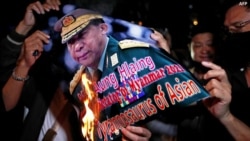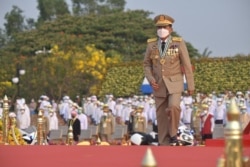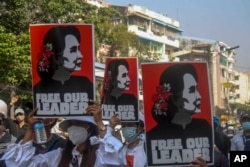Update: This fact check has been edited to include additional context about estimated civilian deaths in Myanmar since the February 2021 coup.
On August 16, the United Nations Special Envoy Noeleen Heyzer made her first visit to Myanmar amid a deteriorating situation in the war-ravaged country.
“Myanmar has been in chaos since the military overthrew the elected government led by Nobel laureate Aung San Suu Kyi early last year, followed by a bloody crackdown on protests against the coup,” the U.N. said of the trip.
The day before Heyzer’s arrival, a military-controlled court sentenced Suu Kyi to an additional six years in prison on what critics call “baseless corruption charges.”
Suu Kyi had already been sentenced to 11 years on a raft of other charges that were tried behind closed doors.
The day of Heyzer’s arrival, Myanmar’s military leader, Min Aung Hlaing, addressed a Moscow-hosted conference on international security by video link.
Min Aung Hlaing said that after the state of emergency ends (it was extended by one year on August 1), more work will be done to prepare the country for an election to be “carried out in accordance with democratic standards.”
In turn, the Russian state broadcaster Sputnik reported on August 16:
“The national stability and peaceful environment in Myanmar ‘are the most important factors for elections,’ the prime minister [Min Aung Hlaing] said, adding that the incumbent government ‘is doing its best to maintain the rule of law, national security, and stability.’”
But claiming the junta is creating “stability” under “rule of law” is false. In fact, the military is the primary driver of lawlessness and instability in the country.
Since the coup, Myanmar’s junta has maintained its grip on power against the popular will through violence. Rather than pave the way for fair elections, the junta continues to persecute former members of the elected government it ousted.
The U.N.’s Independent Investigative Mechanism for Myanmar (IIMM) gathered evidence revealing that “since the military takeover in February 2021, crimes have been committed in Myanmar on a scale and in a manner that constitutes a widespread and systematic attack against a civilian population.”
Those crimes against humanity include murder, torture, deportation, forcible transfer, rape and other forms of sexual violence. The IIMM also found “substantial evidence” the junta has engaged in “the widespread burning of villages and towns, and of targeted or indiscriminate killing of civilians.”
Human rights groups like Britain’s Amnesty International have documented how the military rulers “inflicted collective punishment on civilians,” carrying out both widespread and systematic attacks that kill and injure noncombatants.
As of August 16, the Assistance Association for Political Prisoners (AAPP), run by Myanmar citizens in exile, said 2,201 “people, pro-democracy activists and other civilians” have been killed in the post-coup crackdown.
The U.N. said the IIMM’s annual report was released shortly before the fifth anniversary of the Myanmar military’s “widespread and systematic campaign of violence” against the Rohingya Muslim minority, a campaign the United States and others have called genocide and that sparked a mass exodus of refugees.
Last month, Myanmar announced it had executed four democracy activists – the country’s first executions in decades. The men were tried in closed military courts and denied the right to appeal.
The IIMM said the circumstances in which those men were sentenced to death “could constitute the crime of murder, openly carried out by an organ of government.”
The junta has sentenced more than 100 others to death since the coup. On August 17, Heyzer called on the military to "impose a moratorium on all future executions."
Analysts say fresh elections, tentatively planned for next year, will be used to install a pro-military government.
U.S. Secretary of State Antony Blinken said the United States “strongly encourages the international community not to endorse the regime's plans for sham elections next year,” adding, “[T]hey can be neither free nor fair under present conditions.”
Analysts also say the prosecution of Su Kyi and other members of her government is intended to sideline the opposition ahead of the elections.
The military-controlled Union Election Commission recently said political parties could see their registration “dissolved” if they meet with foreign organizations or individuals.
Myanmar’s neighbors are increasingly angered by the junta’s actions.
On August 3, Malaysia Foreign Minister Saifuddin Abdullah said Myanmar’s military rulers had frustrated other Association of Southeast Asian Nations members by failing to progress on ASEAN’s five-point consensus peace plan.
On August 6, foreign ministers from ASEAN’s 10 member nations said Myanmar’s military rulers would be banned from further ASEAN meetings until that changed.
On August 15, Saifuddin said the recent sentencing of Suu Kyi and execution of the democracy activists showed the junta was ignoring calls to earnestly engage the opposition and end violence in the country.
Myanmar’s military rulers say ASEAN is violating its policy of non-interference.
And to be sure, the military is not the only armed force killing civilians.
The Myanmar Institute for Peace and Security, a non-governmental think tank, reports that targeted killings "are no longer a Tatmadaw (military) preserve but are used as a favored tactic by new armed groups."
The group's 2020-2021 security report published this year notes that members of the local People’s Defence Forces (PDFs), armed opposition groups that rose up to fight back against the military, also started "a campaign of targeted killings and bombings" in May 2021.
The report argues their aim is "to prevent the junta from establishing its governance on the local level." The attacks have also been carried out as retaliation for the military's "blatant and widespread murder and detention of civilians," with the selection of targets "less-than-precise."
"The campaign against [military] forces has included attacks on township ward officials, police, Tatmadaw veterans, administrators, social workers, members of pro-Tatmadaw militias and pro-military political parties, as well as alleged regime informants, who have accounted for most deaths," the report found. It added those attacks have resulted "in hundreds of deaths and injuries."
Some analysts question whether any count of civilian casualties can accurately attribute responsibility given the complexities of fighting among the military, PDFs and ethnic armed groups that have long been involved in regional conflicts.
The Institute for Strategy & Policy – Myanmar, another think tank tracking post-coup data, estimated nearly 5,700 civilian deaths through May, according to Radio Free Asia, a sister U.S.-funded news organization to Voice of America and Polygraph.info. RFA said:
"The numbers are largely in line with reporting by RFA’s Myanmar Service, which had documented at least 5,683 civilian deaths between the military takeover and May 12. On May 10 alone, junta troops slaughtered 29 civilians in Mon Taing Pin village, in Sagaing region’s Ye Oo township, sources recently told RFA, saying the victims appeared to have been 'killed and burned intentionally' by soldiers targeting residents in retaliation for alleged ties to the PDF."
It is no coincidence that Min Aung Hlaing delivered his comments at a Moscow-organized forum.
As Polygraph.info previously reported, Russia has sought to deepen defense and security cooperation with Myanmar since the coup, highlighted by Russian Foreign Minister Sergey Lavrov’s official visit to Myanmar on August 3.
Myanmar’s military has widely used Russian-made military hardware as it seeks to stamp out opposition.
Rights groups like Justice for Myanmar have accused Moscow of “aiding and abetting the military’s genocide, war crimes and crimes against humanity.”








